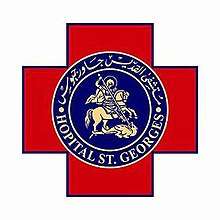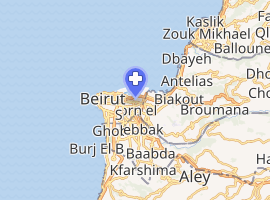Saint George Hospital University Medical Center
Saint George Hospital University Medical Center (Arabic: مستشفى القديس جاورجيوس للروم الأرثوذكس or مستشفى القديس جاورجيوس الجامعي), also known as Al Roum Hospital (مستشفى الروم), was the oldest Lebanese hospital founded in 1878 and one of the three leading Lebanese medical centres, located in Rmeil, Beirut, Lebanon.
| Saint George Hospital University Medical Center | |
|---|---|
 | |

| |
| Geography | |
| Location | Rmeil, Beirut, Lebanon |
| Coordinates | 33°53′38″N 35°31′24″E |
| Organisation | |
| Funding | Non-profit hospital |
| Type | Teaching |
| Affiliated university | University of Balamand |
| Patron | H.E. Metropolitan Elias Audi, President of the Board |
| Network | St George Hospital |
| Services | |
| Emergency department | Yes |
| Beds | 300 |
| Helipad | Yes |
| History | |
| Opened | 1878 |
| Closed | 4 August, 2020 |
| Links | |
| Website | http://www.stgeorgehospital.org |
| Lists | Hospitals in Lebanon |
Overview
The hospital configuration was a T-shaped fifteen-floor building currently housing 200 beds with a modern outlook. It was affiliated with The Centre Hospitalier Universitaire de Toulouse and the Centre Hospitalier Universitaire de Poitiers.
In 2005, a new state-of-the-art building was inaugurated. The rehabilitation and reconstruction of the 1968 building is underway (Phase II)- this new extension will house an additional 200 beds by the end of 2015, thus bringing the total number of beds to 400.
History
Saint George Hospital was founded in 1878 as a non-profit community hospital by Panoyot Fakhoury.[1] A member of the Orthodox community, he donated two rooms in his Gemayze home to be used as a clinic and in-patient facility.
A new 90-bed hospital was built in 1913, followed by another 275-bed facility in 1966. The facility was most recently a 200-bed hospital built in June 2004.
On 4 August 2020, a series of explosions occurred about 1 km (0.6 mi) away from the hospital, at the Port of Beirut, damaging every floor of the hospital, depriving it of power, and forcing it to shut down.[2][3][4] Doctors and nurses were treating patients in a nearby parking lot.[2] Within hours, it discharged all its patients, some to other hospitals, and closed.[5] The building was severely damaged and considered too dangerous to enter,[6] the Hospital's Director of Intensive Care, Dr. Joseph Haddad, was quoted as saying:
There is no St. George Hospital any more. It's fallen, it's on the floor... It's all destroyed. All of it.
It came at a time when Lebanon was struggling, due to the global COVID-19 pandemic, and was in need of more hospital beds, both to treat COVID-19 patients and the over 5,000 injuries caused by the explosions throughout the city.[7][8]
References
- "Archived copy". Archived from the original on 2011-07-27. Retrieved 2010-12-18.CS1 maint: archived copy as title (link)
- Sewell, Abby (4 August 2020). "Hospital treats patients in park". Retrieved 5 August 2020.
- Hubbard, Ben; Abi-Habib, Maria (4 August 2020). "Beiruit: Explosion Report". The New York Times. Retrieved 5 August 2020.
- Chulov, Martin; Safi, Michael; Borger, Julian (4 August 2020). "Huge Explosion rocks Beirut, Lebanon". The Guardian. Retrieved 5 August 2020.
- Ramzy, Austin (5 August 2020). "What We Know and Don't Know About the Beirut Explosions". The New York Times. Retrieved 5 August 2020.
- ""There's nothing left": Beirut doctors say hospitals were so damaged by explosion, they had to turn away patients". www.cbsnews.com. Retrieved 2020-08-06.
- Cheeseman, Abbie (2020-07-31). "'This will get ugly': Lebanon's health system trapped between economic catastrophe and coronavirus". The Telegraph. ISSN 0307-1235. Retrieved 2020-08-06.
- "We're the hospital of last resort': Inside the coronavirus wards battered by Lebanon's economic crisis". The Independent. 2020-04-10. Retrieved 2020-08-06.